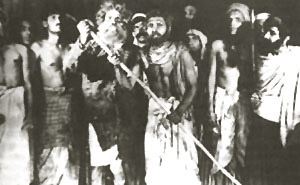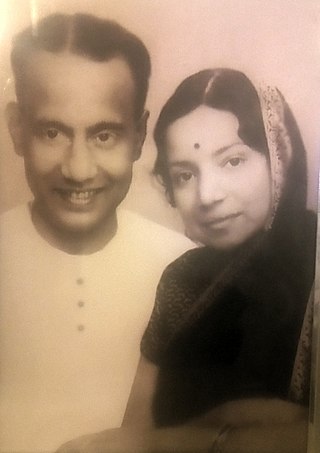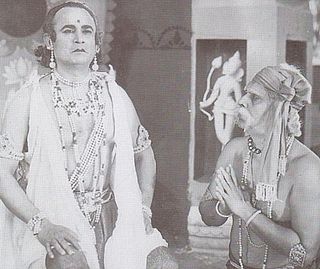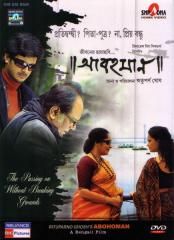Related Research Articles

Utpal Dutt was an Indian actor, director, and writer-playwright. He was primarily an actor in Bengali theatre, where he became a pioneering figure in Modern Indian theatre, when he founded the "Little Theatre Group" in 1949. This group enacted many English, Shakespearean and Brecht plays, in a period now known as the "Epic theatre" period, before it immersed itself completely in highly political and radical theatre. His plays became an apt vehicle for the expression of his Marxist ideologies, visible in socio-political plays such as Kallol (1965), Manusher Adhikar, Louha Manob (1964), Tiner Toloar and Maha-Bidroha. He also acted in over 100 Bengali and Hindi films in a career spanning 40 years, and remains most known for his roles in films such as Mrinal Sen’s Bhuvan Shome (1969), Satyajit Ray’s Agantuk (1991), Gautam Ghose’s Padma Nadir Majhi (1993) and Hrishikesh Mukherjee's breezy Hindi comedies such as Gol Maal (1979) and Rang Birangi (1983). He also did the role of a sculptor, Sir Digindra Narayan, in the episode Seemant Heera of Byomkesh Bakshi on Doordarshan in 1993, shortly before his death.

Binodini Dasi (1863–1941), also known as Noti Binodini, was an Indian Bengali actress. She started acting at the age of 12 and ended by the time she was 23, as she later recounted in her noted autobiography, Amar Katha published in 1913.
Girish Chandra Ghosh was a Bengali actor, director, and writer. He was largely responsible for the golden age of Bengali theatre. He cofounded the Great National Theatre, the first Bengali professional theatre company in 1872, wrote nearly 40 plays and acted and directed many more, and later in life became a noted householder disciple of Sri Ramakrishna.

Bengali theatre primarily refers to theatre performed in the Bengali language. Bengali theatre is produced mainly in West Bengal, and in Bangladesh. The term may also refer to some Hindi theatres which are accepted by the Bengali people.
The Minerva Theatre is a theatre in Kolkata, built in 1893. It was erected at the site on Beadon Street where the Great National Theatre stood before. The maiden play held on this stage was 'Macbeth'. It was initially owned by Nagendra Bhusan Mukhopaddhaya. In course of time, it witnessed several transfers of ownership. Sri Girish Chandra Ghosh is noted for having given the last spectacular performance of his life in this theatre. "Minerva" was burnt down in a fire in 1922. However, it was renovated and in 1925, it regained its old status and play acting was resumed. The Minerva, along with the Star and The Classic Theatre, were also one of the places where the first motion pictures in Bengal, made by Hiralal Sen, were screened.

Bagbazar is a neighbourhood of North Kolkata, in Kolkata district in the Indian state of West Bengal. The area, under Shyampukur police station of Kolkata Police, has been, along with neighbouring Shyambazar, the citadel of the Bengali aristocracy. Bagbazar has played an active role in growth and development of Kolkata.

Malati Ghoshal was an Indian Rabindra Sangeet singer and one of Rabindranath Tagore's 'Panchakanya' exponents.

Shishir Kumar Bhaduri or Sisir Kumar Bhaduri was an Indian stage actor and theatre founder, commonly referred to as the pioneer of modern Bengali theatre. He was an actor, director, playwright and scenic designer.
Kaushik Sen is an Indian actor in film, television and theatre, based in Kolkata. He is the director of the theatre group Swapnasandhani. He won a Bengal Film Journalists' Association Award for best supporting actor for his performance in the Mrinal Sen directed film Aamar Bhuvan. He was awarded Girish Purashkar 2023 by the Cultural Department of the Government of West Bengal for his extraordinary contributions to theatre. This year he was also awarded Telly Academy Best Actor Award for Godhuli Alap series.

Abohomaan is a 2010 Bengali-language film by Rituparno Ghosh, which explores the nuances of relationships through a married film director who falls in love with an actress who is the same age as his son. The film stars Deepankar De, Mamata Shankar, Ananya Chatterjee, Jisshu Sengupta, Riya Sen and is produced by Mahesh Ramanathan, Reliance Big Pictures. Rituparno Ghosh, Arghyakamal Mitra, Mahesh Ramanathan and Ananya Chatterjee won National Film Awards in 2010 for Best Director, Best Editor Best Bengali Film and Best Actress respectively. The film was screened in the Marché du Film section of the 2009 Cannes Film Festival.

Ananya Chatterjee is an Indian actress who works in Bengali films. Known for her role in Abahoman which won her a National Award. She started her career as a TV actress. She acted in several TV serials and films, including three directed by Anjan Dutt. Her role as the muse of a married director in Abahoman, directed by Rituparno Ghosh, won her the National Film Award for Best Actress.
The Hindoo Patriot was an English weekly published from Calcutta in the later half of the nineteenth century in Bengal.
Kapalkundala is a Bengali romance novel by Indian writer Bankim Chandra Chattopadhyay. Published in 1866, it is a story of a forest-dwelling girl named Kapalkundala, who fell in love with and married Nabakumar, a young gentleman from Saptagram, but eventually found that she is unable to adjust herself with the city life. Following the success of Chattopadhyay's first novel Durgeshnandini, he decided to write about a girl who is brought up in a remote forest by a Kapalika and never saw anyone but her foster-father. The story is set in Dariapur, Contai in modern-day Purba Medinipur district, Paschimbanga where Chattopadhyay served as a Deputy Magistrate and Deputy Collector.
Durgeshnandini is a Bengali historical romance novel written by Indian writer Bankim Chandra Chattopadhyay in 1865. Durgeshnandini is a story of the love triangle between Jagat Singh, a Mughal General, Tilottama, the daughter of a Bengali feudal lord and Ayesha, the daughter of a rebel Pathan leader against whom Jagat Singh was fighting. The story is set in the backdrop of Pathan-Mughal conflicts that took place in south-western region of modern-day Indian state of Paschimbanga during the reign of Akbar.

Shaoli Mitra [alternatively spelt as Shaonli Mitra ; c. 1948 – 16 January 2022) was an Indian Bengali theatre and film actress, director, and playwright. She played the role of Bangabala in Ritwik Ghatak's Jukti Takko Aar Gappo. She is the daughter of Sombhu Mitra and Tripti Mitra, who were also theatre personalities.
Monami Ghosh is an Indian Bengali film and television actress with a career spanning almost two decades. She has acted in several television serials, among which the 2009 ETV Bangla serial Binni Dhaner Khoi is noteworthy.
Basabdatta Chatterjee is a Bengali actress who mainly works in Bengali television serials. She made her debut in the popular soap Gaaner Oparey directed by Rituparno Ghosh. She rose to fame by acting in the lead female role in the comedy soap Boyei Gelo, which aired on Zee Bangla. But later, due to other engagements, she stopped acting in the serial. Boyei Gelo was Basabdatta's seventh work. Subsequently, she worked in a daily soap Mon Niye Kachakachi on Star Jalsha, where she acted the role of Dr. Labanya Sanyal Kapoor. Currently, she acts as Netaji Subash Chandra Bose's mother Prabhabati Devi on Zee Bangla's daily soap Netaji.
Asit Bandopadhyay was a Bengali dramatist, screenwriter and actor. He was associated with the Nandikar theater group. He lived and worked in Kolkata, India. He was a playwright, screenwriter, director and actor.
Sarajubala Devi (1912-1994) was a Bengali actress and singer.
Ardhendu Sekhar Mustafi was a Bengali actor, playwright and theater personality.
References
- 1 2 Ramaswamy, Vijaya (1 January 2003). Re-searching Indian women. Manohar. p. 347. ISBN 9788173044960.
- 1 2 Kolkata Puroshree (PDF). Kolkata: Kolkata Municipal Corporation. 20 April 2010. p. 6.
- 1 2 3 Sengupta, Subodh Chandra (May 1976). Samsad Bangali Choritabhidhan (1st ed.). Kolkata: Sahitya Samsad. p. 190.
- ↑ Lahari, Sukriti (25 July 2015). বিনোদিনীর পরে (in Bengali). ABP. Anandabazar Patrika. Retrieved 18 March 2019.
- ↑ Sahni, Rohini; Shankar, V. Kalyan; Apte, Hemant (9 July 2008). Prostitution and Beyond: An Analysis of Sex Workers in India. SAGE Publications India. p. 326. ISBN 9788132100362.
- 1 2 3 4 5 Vidyabhushan, Upendranath (13 February 1920). Binodini O Tarasundari. Kolkata: Shishir Publishing House.
- ↑ Murshid, Golam (2005). সুকুমারী থেকে সুচিত্রা (in Bengali). Mazharul Islam. অন্যদিন ঈদ সংখ্যা. p. 106.
- 1 2 Mallik, Wahida. "Tara Sundari". Banglapedia. Retrieved 15 November 2017.